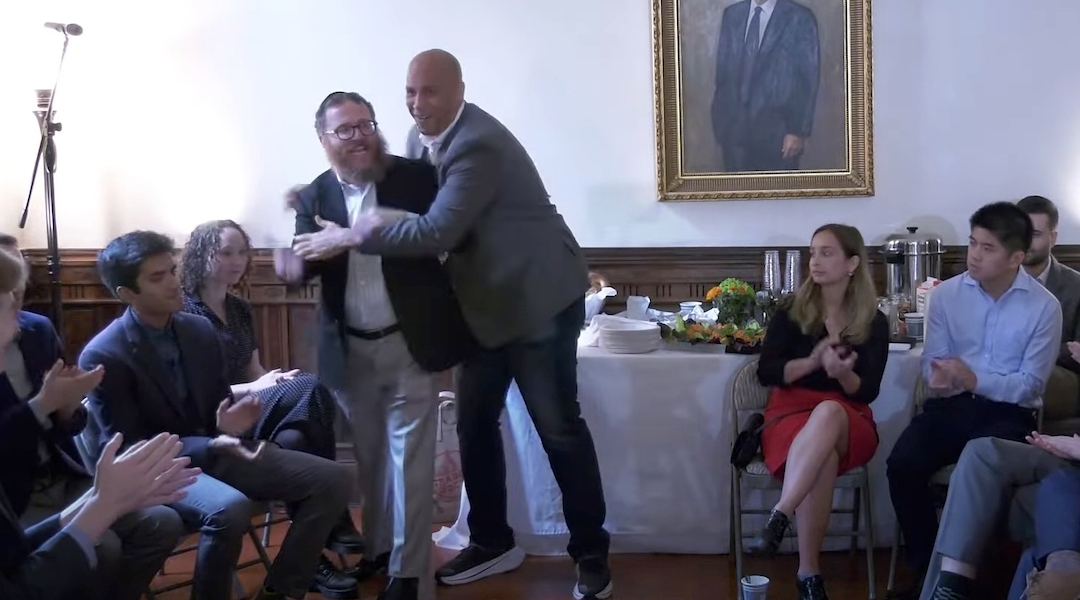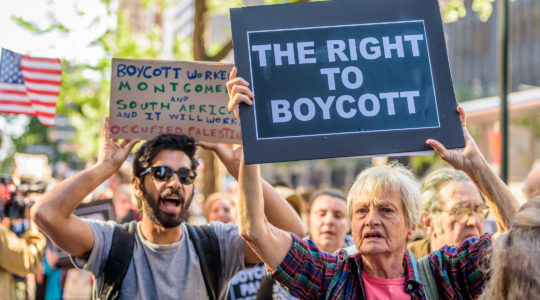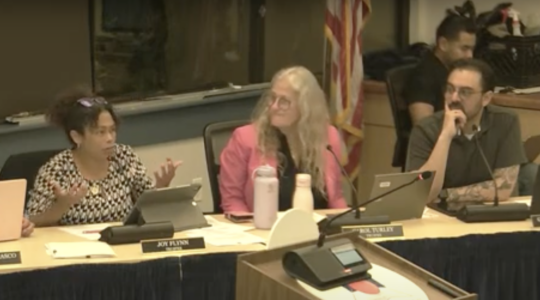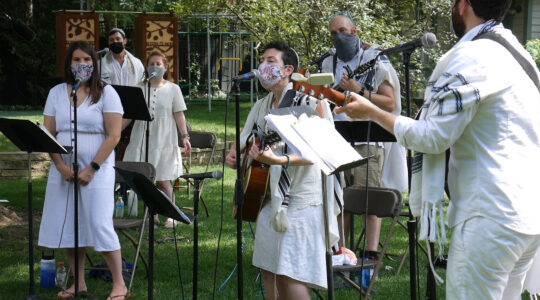Fissures are opening in a Jewish society at Yale University known for its commitment to open discourse after its director announced plans to host the far-right Israeli minister Itamar Ben-Gvir.
At least three members of the selective society have resigned over director Rabbi Shmully Hecht’s decision to host Ben-Gvir, whose record includes extremist rhetoric and convictions for crimes including providing support to a terror organization.
Until recently, politicians on Israel’s right avoided partnering with Ben-Gvir because he had hung a picture of Baruch Goldstein, who massacred 29 Muslims at prayer in Hebron in 1994, in his home. Now, he is national security minister — and most American Jewish groups are eschewing him on his first official visit to the United States. Another group that was hosting him, facing backlash, said it canceled the event.
But Hecht told the Jewish Telegraphic Agency last week that he had a different take. “I admire Ben Gvir,” Hecht told JTA in an email last week. “Itamar promotes what he believes is best for his people that democratically elected him.”
Several Shabtai members objected to Hecht’s comments, in which he praised both Ben-Gvir as a “bold, resolute leader” and the extremist Rabbi Meir Kahane, whom Ben-Gvir admires.
“Shabtai was founded as a space for fearless, pluralistic Jewish discourse,” two of the members who resigned, both Jewish Yale alums, wrote in an email to a Shabtai listserv viewed by JTA. “But this event jeopardizes Shabtai’s reputation and very future.”
One of the letter’s authors, David Vincent Kimel, said in an interview that he used to admire Shabtai and Hecht — until the Ben-Gvir invite.
“I’m deeply concerned that we’re increasingly treating extreme rhetoric as just another viewpoint, rather than recognizing it as a distortion of constructive discourse. When the loudest voices are those at the extremes, they overshadow the nuanced, moderate perspectives that often hold the key to genuine understanding and compromise,” he said. “Just like people calling for the dismantling of Israel, the killing of Jews on Oct. 7, are also a grotesque extreme.”
Their pushback, which comes in addition to public protests by both other Jewish Yale graduates and current Yale students, reflects tensions behind the scenes at Shabtai, established in the 1990s as a Jewish intellectual salon. The dissent reflects division among elites over the limits of acceptable speech on Israel — and how the current political moment is testing long-time relationships, including within Shabtai.
The society has no formal affiliation with Yale. Still, Ben-Gvir’s visit has prompted a response from within the broader Yale community. More than 200 people on Tuesday announced their intent to form an encampment to protest Ben-Gvir. The attempt was disbanded hours later, after Yale’s “Free Expression Facilitator” announced the students were in violation of protest rules and risked disciplinary action and arrest.
“This is only the beginning,” a coalition of Yale pro-Palestinian groups who promoted the encampment announced on Instagram the morning after being disbanded. “Intifada until victory!”
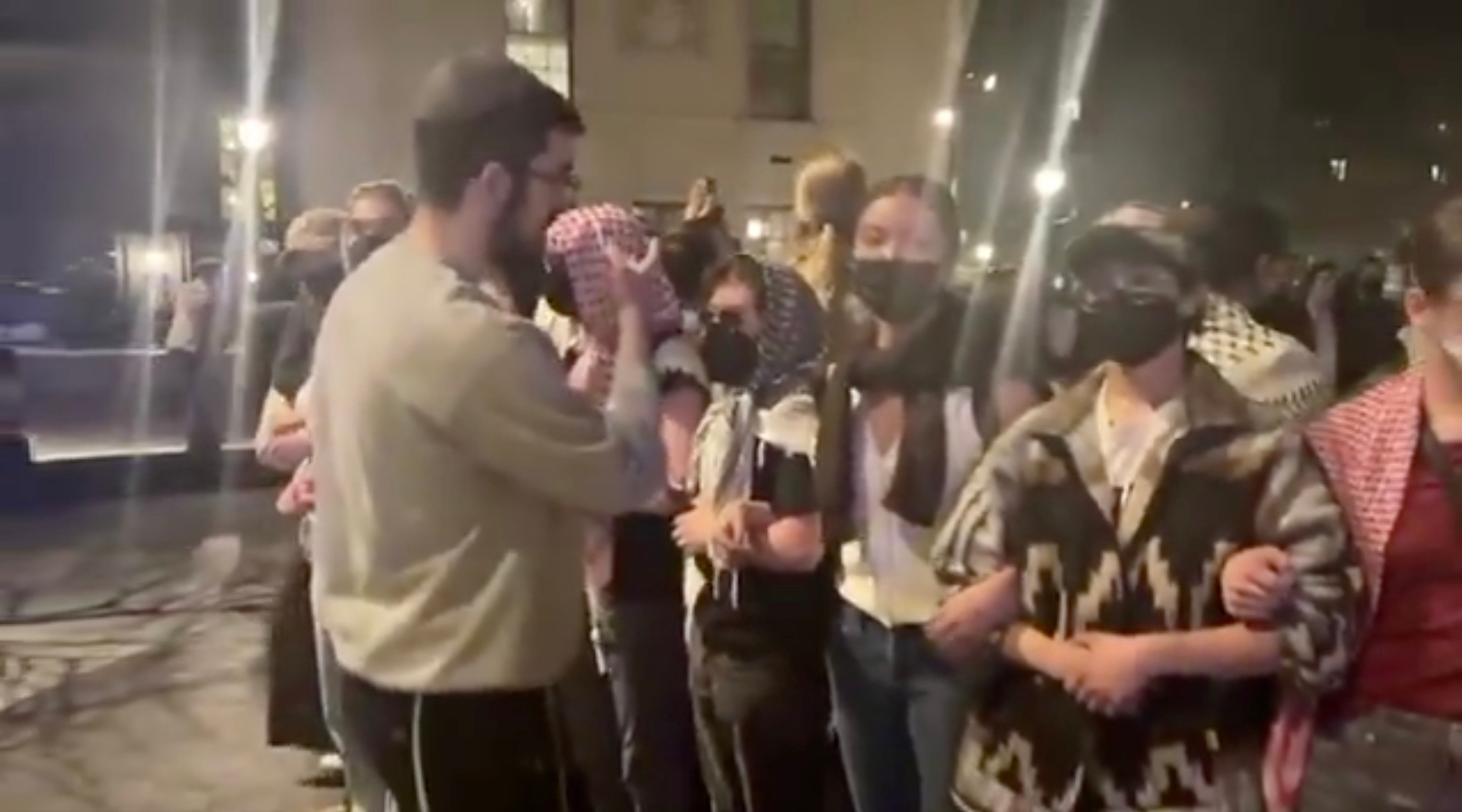
Netanel Crispe, a Hasidic student and activist at Yale University, confronts pro-Palestinian protesters attempting to start a new encampment at the university in New Haven, Connecticut, April 22, 2025. The protesters were organizing against Jewish off-campus Yale society Shabtai’s invitation to far-right Israeli minister Itamar Ben-Gvir to speak near campus. (Screenshot via X/Courtesy of Netanel Crispe)
Now, a rally is planned for outside the venue where Ben-Gvir is set to appear. “When murderers are invited, the people must show up,” a flyer for the protest shared on Instagram reads. “Our people are slaughtered. Our children buried. Yet war criminals are given a stage.”
Jewish and Israeli students who oppose Ben-Gvir are also planning a protest. And earlier on Wednesday, a group of 20 rabbis who themselves are Yale alums published an open letter through T’ruah, a liberal rabbinic group, urging Shabtai to disinvite Ben-Gvir. “We believe strongly in free speech, but free speech does not mean that everyone has to be invited to speak,” the letter reads.
The critique cuts at the historic heart of Shabtai, founded in 1996 as a Jewish alternative to the so-called “secret societies” of the Ivy League, like Skull and Bones, where membership is exclusive, opaque and lifelong. Its core activity is salon-style events in which a broad range of ideas are elevated and debated.
Located in a historic mansion near Yale’s New Haven campus, Shabtai was founded with the name Eliezer by Hecht, who previously founded Yale’s Chabad-Lubavitch house, along with now-Sen. Cory Booker and Jewish academics Ben Karp, Michael Alexander and Noah Feldman — a liberal constitutional scholar and the author, last year, of “To Be a Jew Today.” Requests for comment to the other co-founders were not returned.
Since its founding, a small number of students in their final year of school at Yale — both Jews and non-Jews — are admitted as members every year, and remain members for life. Unlike other societies of its ilk, Shabtai opens its doors to invited guests and at times the public for its events, which members are required to attend and which take place twice a week, including on Shabbat.
The society went by several different names until it was renamed Shabtai in 2014, following a donation of more than $1 million from Israeli businessman Benny Shabtai that also funded the purchase of the mansion. (A few years later the group’s namesake sued the organization and Hecht, claiming his gift had been misallocated; that suit was later withdrawn.)
Over kosher dinners, Shabtai guests listen to lectures and engage in debates with notable visiting guests, many of whom expound on Jewish topics. Shabtai’s student members play a large role in organizing and introducing the talks. Phones are put aside for the duration of the events, which can last for several hours; in recent years they have also been recorded and posted to YouTube.
It’s all part of what Hecht, who selects many of the guests himself and who often steers or freely interjects in the discussions, has described as his vision for “a place to engage with people you disagree with.” Hecht has cultivated strong relationships on both sides of the political aisle: in addition to Booker, former GOP presidential candidate Vivek Ramaswamy — who floated ending U.S. aid to Israel during his campaign — was also a Shabtai member and has called Hecht a mentor.
Even Shabtai members who disagree with Hecht’s politics praise both him and his wife Toby, who helps run the center; the two have created “a second home to so many of us,” the two alums wrote in their resignation letter.
Historically, Shabtai’s guests have run the ideological gamut. In addition to Booker, a New Jersey Democrat who returned to the center in 2022, other recent guests have included Jodi Rudoren, until recently the Forward’s editor-in-chief; Suzanne Trimmel, head of literary free-speech group PEN America; and William Schabas, a former United Nations investigator who led an investigation into possible war crimes committed by Israel during the 2014 Gaza war. The society has even hosted anti-Zionists on occasion, including Philip Weiss, the Jewish creator of the anti-Zionist publication Mondoweiss.
Kimel said his own debate with Schabas a decade ago as a highlight of his time at Yale. “I was impressed that they really did try to bring pluralism to the table,” he said.
But after Oct. 7, Hecht appears to have become publicly less forgiving of Jewish voices on the left — which some of the dissenting members say has led to “inconsistency” with how his free-speech principles are applied.
In November 2023, Hecht circulated a Change.org petition through the Shabtai network that called for “the global excommunication of Jews who endanger the Jewish people.” The petition, which has earned 91 signatures to date and does not itself mention Shabtai, named 10 Jewish figures with a history of criticizing Israel ranging from liberal to far-left.
Among the names Hecht said he holds “responsible for fostering the rise of global antisemitism and endangerment of Jewish lives worldwide”: New York Times columnists Thomas Friedman and Peter Beinart; J Street founder Jeremy Ben Ami; acclaimed playwright and Israel critic Tony Kushner; IfNotNow co-founders Simone Zimmerman, Max Berger and Alissa Romanow; left-wing academics Norman Finkelstein and Noam Chomsky; and Yisroel Dovid Weiss, of the anti-Zionist haredi Orthodox sect Neturei Karta.
These Jews, Hecht maintained, should be barred from “synagogues, schools, community centers, nonprofits, weddings, and bar mitzvahs,” as well as from burial in Jewish cemeteries and entry to the state of Israel. With enough signatures, Hecht promised, “we will request Rabbinical Courts around the world to Halachically enforce this grassroots-excommunication.”
Given Hecht’s support for excommunicating such Jews for their beliefs, the Shabtai alums wrote, his decision to host Ben-Gvir “is not promoting free speech, but rather legitimizing terrorism and state repression.”
“Free speech cannot be selectively applied,” they wrote. “In fact, if Ben Gvir’s invitation is justified by free speech, then that principle must extend to equally extreme voices on the other side, as well as to all Yale student protestors, even those we strongly disagree with. If it doesn’t, this is more about advancing one narrative than free speech.”
Some Jewish leaders have exhorted Jewish groups to boycott Ben-Gvir on his first visit to the United States since becoming Israel’s national security minister in a far-right coalition government with Prime Minister Benjamin Netanyahu, an alliance that many non-Orthodox Jewish groups, along with liberal Israelis, have strongly opposed.

Israel’s National Security Minister Itamar Ben-Gvir visits the Temple Mount in Jerusalem’s Old City, April 2, 2025. (Yonatan Sindel/Flash90)
Members of the anti-Netanyahu Israeli protest group UnXeptable demonstrated against Ben-Gvir from the moment he disembarked his plane in Fort Lauderdale, Florida, on Monday. (A spokesperson for the minister’s office said his Florida stops included meetings with Boca Raton and Bal Harbour Jewish community leaders, visits to Israeli-owned businesses including a firearms store, and a speech at the home of former Israeli government official Ori Schwartz.)
“Some ideas are so beyond the pale, so contrary to Jewish values that have sustained our people throughout the millennia, and so at odds with the values on which Israel was founded, that they do not deserve legitimization in the public square,” Rabbi Rick Jacobs, president of the Union for Reform Judaism, wrote in an op-ed this week in the left-leaning Israeli newspaper Haaretz. He urged: “Don’t invite him to your congregation or welcome him to your community. Educate your synagogue and Jewish community on the dangers Ben-Gvir poses.”
Hecht seems to be doubling down on including Ben-Gvir since drawing criticism. In addition to the New Haven event, Hecht also plans to host talks with Ben-Gvir on New York’s Upper East Side on Thursday and in Washington, D.C., later this week. A video of Ben-Gvir landing in New York on Wednesday shows him embracing a smiling Hecht.
In an emailed invitation he sent to Yale faculty on Friday, viewed by JTA, Hecht linked the Ben-Gvir event to the post-Oct. 7 campus climate for Jews.
“In light of the Anti Israel/Anti-Semitic climate of today’s Ivy League campuses, it it vital that we at Yale hear perspectives from unapologetic Israeli leaders committed to securing the Holy land of Israel as the one eternal homeland of the Jewish People, and a refuge for its non-Jewish citizens and minorities that enjoy democracy in a region of tyrants and demagogues,” Hecht wrote. (Ben-Gvir, in contrast to Hecht’s descriptions of his views, has said the rights of Jewish Israelis should be paramount; Rep. Ritchie Torres, a staunchly pro-Israel Democrat, has repeatedly called him a “demagogue.”)
Hecht went on to call Shabtai “a true oasis for free speech at Yale and the world at large,” adding, “At a personal level I believe it is specifically unapologetic events such at [sic] this one that has preserved Yale as a more moderate safe haven for Jews in the current toxic Ivy community of extremism.”
Following his initial comments last week, in which he described Shabtai’s free-speech principles as “Talmudic,” Hecht did not respond to follow-up questions from JTA.
Beyond the alumni rebellion, Jewish students at Yale who had once celebrated Shabtai as a place to engage in thoughtful debate amid a more broadly hostile campus environment are now criticizing it.
One current Jewish Yale student who has himself participated in Shabtai events in the past rebuked the group’s decision to host Ben-Gvir in the student newspaper.
Senior Liam Hamama, who is active in the liberal pro-Israel group J Street, was directly involved in another controversial Shabtai event last year when he attended an event with Simcha Rothman, another far-right Israeli politician, and challenged him directly.
But now, Hamama wrote, a line had been crossed. He compared Ben-Gvir to the white supremacist mass shooter Dylann Roof, Russian dictator Vladimir Putin, and Hamas supporters, saying Shabtai wouldn’t invite any of them to speak, either.
“When we treat someone as an honored guest and wine and dine with them,” Hamama wrote, “we signal that their views are within the realms of that which we deem acceptable and legitimate speech.”
JTA has documented Jewish history in real-time for over a century. Keep our journalism strong by joining us in supporting independent, award-winning reporting.
